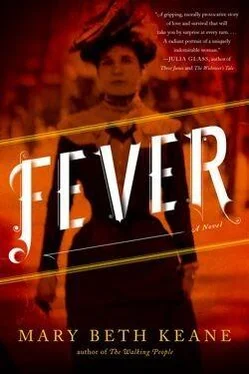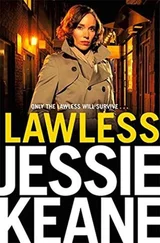“You’ll go if you want to live here,” she told him simply, so he went back, and back, and soon they sent him home with directions on how to dole out the medicine and at what intervals. After a month they said he could stop taking the medicine, but to keep a supply in his old pocket flask. That he’d never had need for that flask proved he never needed the cure in the first place. It was just a matter of deciding, and he’d decided. It was a 100 percent guarantee as long as he followed the doctor’s instructions, and the doctor’s instructions were, don’t drink.
Samuel was preparing for a test that would allow him to skip two grades ahead at school and take a few courses at the community college. If he scored high enough he would go for free, except for the cost of books. They had to be very, very quiet around the flat so as not to interrupt the boy’s studies, and for the first time since he’d known her, Liza shushed him one morning when he began to ask if there was any more coffee on the stove. She shushed Alfred and cast a worried look at Samuel, who had his head bent over a mathematics book, and Alfred saw then that she’d never love him, never love any man, as much as she loved that boy.
The ice company stable did not offer overtime, and the evenings were too long between five o’clock, when his shift ended, and ten o’clock, when he went to bed. To get out of their rooms and give the boy some quiet, Alfred had started checking in with Michael Driscoll. The old man needed boards replaced on the floor, a cabinet fixed, his rotted bed carried out to the sidewalk and replaced with a new one, the plaster on the wall behind the sink touched and smoothed. “A little late for this kind of attention,” Alfred had teased the first time he went over.
“Never too late,” Driscoll had said. “I’ve my eye on a fine woman.”
“You’re joking.”
“You’ll get there. Then you’ll know. And someone else will laugh.”
Fair enough, Alfred supposed, and went on with the work he was assigned. When he finished a job, he’d let a few weeks go by and then he’d check in on the old man to see what he’d stored up for him. In the stretches when Driscoll had no work for him he hung around the stable after his shift to talk to the man who relieved him, or he walked down to the docks to watch what was being unloaded.
One evening, though he didn’t know Alfred would be stopping around, Driscoll answered the door as soon as Alfred knocked. “Well? Did you see her?” The old man asked, and looked over Alfred’s shoulder toward the empty stairwell. He coughed into his sleeve, and then rolled it up.
“Who?” Alfred asked.
“Mary. She’s out there. I was talking with her not one minute ago.”
“Mary Mallon is in this building?”
“She moved in with Mrs. Borriello a week ago. You didn’t know?” Alfred felt a tremor travel down his arms and legs, and he thought he heard a woman’s step pass in the hall. He looked hard at Driscoll’s face to make sure the old man wasn’t having him on. He’d sent a letter to her hut on North Brother a few months earlier and when she didn’t write back he figured she was still that angry with him, and had a right to be. She’d said the lawyer was optimistic. She’d said it might be only a few more months. But why would he have believed it?
“Are you serious, Driscoll?”
“I swear on my life.”
“How? When was she released? Was she looking for me? What did you talk about?”
“She was just passing through the vestibule as I was searching for my key. I said hello and so did she so then I said I was glad to see her back and she thanked me. She might still be climbing the stairs. Go on. Go after her.”
Instead, Alfred pushed past him and looked at the weeping faucet that needed to be fixed. As he took inventory of what he’d need, he felt the other man’s eyes sizing up the shape of his back, his stance, trying to read what was written there. He needed time to think. He had no idea what he’d say. Every part of his body urged him toward the door. Why was she staying with Mrs. Borriello? What was she doing now? He imagined what he’d say to her, and when he realized he couldn’t think of a place to begin, he imagined instead what she’d say to him, and knew that the first thing she’d ask was whether he was married yet to Liza Meaney, and after he said that he wasn’t, she’d ask if he was still living with her and her boy, and he’d have to say yes, and then the meeting would be over.
“I can’t come around tomorrow,” Alfred said gruffly to Driscoll once the faucet was fixed. “I’ll do the rest another time.”
“You’ll have to face her sooner or later,” Driscoll said, and Alfred had a wild impulse to shove him, to throttle him, but it passed immediately. It was himself he was angry at. No one else.
“Why do I have to?” he said, though he wanted to do more than face her. He wanted to run upstairs right that second to see her, beg her forgiveness, take her into his arms. How had it happened? How had he missed it? How could he have failed to know she was back in the city?
Alfred stayed away from 302 East Thirty-Third Street as he tried to make sense of Mary’s return. In the mornings, when he woke to Liza’s blonde curls on the pillow next to him, he thought immediately of Mary, sleeping so close to the rooms they’d shared for so many years, seemingly back in her old life except without him. “Everything all right at the stable?” Liza asked several times, and he snapped at her that it was, and tried to stay out of their rooms even more than usual. Another time she asked him if he carried his medicine with him when he went out, and he realized she thought he’d fallen off the wagon. It was true he’d gone and stood outside Nation’s Pub for the first time in months, but he hadn’t gone in, and the pull he felt from 302 East Thirty-Third was much stronger. Finally, after two weeks of turning ’round and ’round the news of Mary’s return, he finished his work at the stable and made for Driscoll’s place, to finish up the work that was there waiting for him, and to decide one way or another if he would ever go near the place again.
As he walked up Third Avenue he felt the possibility of seeing her again like a singing bird lodged in his chest, struggling to free itself. He stopped at the peanut cart on Twenty-Ninth Street to get a bag for himself and Driscoll to share, but even this was a show for her, in case she was watching, in case he should turn around and she should be standing there, half smiling, ready to say, “Well, well, well. Look who it is.”
It was the first truly bitter evening of the season, and there was no one on the stoop or in the vestibule when Alfred arrived at the building. He stood at the bottom of the silent stairwell and looked up, counting the railings to the fourth floor. When Driscoll didn’t answer his knock Alfred felt along the top of the door frame for the key that was hidden there, and let himself in. “Hello?” he called, and when he got no answer he opened the door to Driscoll’s bedroom and found him lying there, twisted up in the sheets. “Not feeling myself,” Driscoll said without looking at Alfred, and as Alfred got closer to the bed he could see that the older man was wincing, and trying to find relief from whatever was bothering him by shifting from side to side, clutching at his pillow. He coughed for several minutes. For the first time in two weeks, Alfred pushed thoughts of Mary to the side.
“What is it?” Alfred asked to the back of the man’s head, and noticed how thin Driscoll’s hair was there, how small and delicate-seeming the back of his skull was, like a smooth, hairless egg.
“Go on,” said Driscoll. “Another time.” But Alfred stood there like a boy, unsure what to do.
Читать дальше












